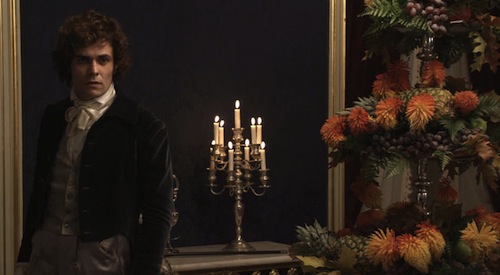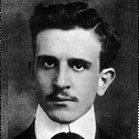
“Mysteries of Lisbon” is a 2010 film of epic proportions, a 4 1/2 hour Portuguese-French period drama that was included on several Best Of lists last year. It’s a visual stunner — every shot looks like a 19th century oil painting, not to mention the fascinating camera work, long takes, and bold editing. But for me the big mystery watching this film was “what is this music??” Two names are listed under the music credit on the movie’s web site: Jorge Arriagada and Luís de Freitas Branco.
Sr. Arriagada is a Chilean countryman of the film’s director, Raúl Ruiz, and has been one of his most frequent collaborators. His name is listed as the sole musical credit (“Original Music by”) on MoL‘s imdb page and in the film’s credit reel, which would make you think, OK, this guy must have written the music for the film… so who’s the other name?

Well, it turns out that this is the real mystery of Mysteries of Lisbon. Here’s some copy from the film’s web site:
To allow the Lisbon of the 19th century to ring true, Ruiz turned to the music of the great Portuguese composer Luís de Freitas Branco, a name that is synonymous with the Portuguese culture of the 20th century. His work continues to be a reference, with special mention for Paraísos Artificiais and Vathek, considered the jewels of modernism he himself created. He composed four symphonies of a classic quality that truly denote his appreciation for the polyphonic past of Portugal.
He died in 1955.
I found this text rather intriguing. (Let’s ignore for a second the fact that this was obviously and poorly translated from god-knows-what Romance language and that the phrase “polyphonic past of Portugal” is probably the title of some lame musicologist’s blog.) I may know nothing of the Portuguese culture of the 20th century, but I do know a few things about modern music, and I had never come across the name Freitas Branco, much less the music he wrote.
So began the investigating. It turns out that Sr. Freitas Branco’s entire orchestral output has been released on Naxos (who else?) as recorded by Alvaro Cassuto and the Ireland RTE National Symphony Orchestra. And what an output it is.
Having now listened through Freitas Branco’s four symphonies, two orchestral suites, and several tone poems, I can say this: almost all of the music (and all of the distinguished music) used in Mysteries of Lisbon is his. I can also say that Sr. Freitas Branco’s music has nothing to do with the Lisbon – or anywhere else for that matter – of the 19th century, but it has a surprising amount to do with film music of the 20th and 21st centuries.
This composer has flabbergasted me. Some of his music is very derivative indeed; his youthful “Suite alentajana” sounds like a pastiche reenactment of Rimsky-Korsakov’s greatest hits. There’s hints of Chausson and Vaughan Williams and even Bruckner. But this composer also created strikingly original music, most of it very dark in mood, with strident harmonies and brooding orchestration.
Have I piqued your interest yet? Here are some of the themes that feature prominently in Mysteries of Lisbon:
Symphony No. 1 (1924), mvmt. 1:
Symphony No. 1, mvmt 2:
Where did this stuff come from?? It’s so moody and enigmatic, weirdly proto-Herrmann, and — what? — post-Rachmaninoff? It seems custom engineered for film:
Symphony No. 2 (1926-27), mvmt. 2:
This next piece sounds like Stephen Sondheim and Philip Glass teamed up to write a Bruckner symphony:
Symphony No. 3 (1930 – 44), mvmt. 1
But here’s the real kicker, a section from a symphonic poem titled Vathek. This canon for 59 voices was written in 1913, but it sounds much closer to Ligeti or Schnittke than it does to Stravinsky’s boldest pages (it pre-Bartóks Bartók, while we’re at it):
This stuff is amazing, right? And totally neglected and unknown and we should be playing it at least SOME of the time, right?? I’m so glad it made its way into the soundtrack of Mysteries of Lisbon, and I have to give mad props to Raúl Ruiz, because he used it just right. But, continuing the mini-theme from my last post, it’s at least mildly deceptive that Jorge Arriagada’s name is the default credit for the music in this film. I’m sure Sr. Arriagada made a valuable contribution to the project, and I haven’t gone back and tallied up the music minute by minute, but I’d have to guess that at least 75% of the music in this very long film belongs to Sr. Freitas Branco.
Why not help even out the disparity: buy the Freitas Branco oeuvre here. Not that he’ll really care. But I will! And you’ll enjoy it! And we’ll all be happy! And moody. Oh, and you should watch Mysteries of Lisbon too — it’s really great!
Many thanks for alerting me to Freitas Branco – I will certainly be finding some recordings. Your excerpts have whetted my appetite.
damnit, only a violin concerto…